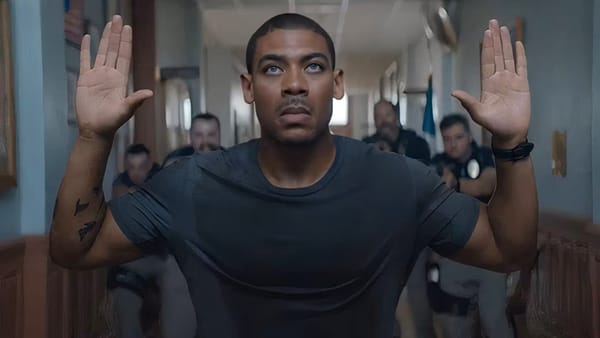One Good Film: "Benediction"
(For Terence Davies, 1947-2023, and for Israel.)

War seemed to literally shadow the cinema of Terence Davies – war and popular music. The former forever pulls the human race toward disaster and leaves us reeling in its aftermath, the latter binds us together in sentimentality and sentiment. The worst of us on one side and, on the other, the artless melodies that help us paper over the abyss. Nostalgia fueled films like “Distant Voices, Still Lives” (1988), “The Long Day Closes” (1992), and “Sunset Song” (2015), but not the simple nostalgia of “things were better then.” Davies recalled his beloved, benighted England with a poetic clarity that could take your breath away, cruelty co-existing with rapture, carnage with rebirth, love with death. For him, the greyness of his childhood’s postwar London existed in counterpoint to the gorgeous Technicolor lies that swirled down from the neighborhood movie screen and the rickety-tick optimism of the hit parade. In the gulf between these two poles the filmmaker came to define his own otherness as a queer boy in a repressed culture, and he developed a style unique in the history of film: For all intents and purposes, Davies’ movies are musicals in which the songs well up on radios and on scratchy victrolas in place of everything his characters are unable to say to each other. (The exceptions are two gorgeous, tough literary dramas: “The House of Mirth,” from 2000, with a towering Gillian Anderson as Lily Bart, and “A Quiet Passion,” which features an exquisitely cast Cynthia Nixon as Emily Dickinson.)
I’m writing this a few days after Terence Davies has died, at age 77, and also a few days after the latest demonstration of our species’ unparalleled gift for visiting savagery upon its own kind, this time in Israel. My own optimism is in very short supply at the moment, as I imagine yours might be too, but I am not so delusional as to feel I can offer any punditry that would be of any use to anyone. You will find no shortage of firmly held opinions elsewhere; such opinions, arguably, are what have led us here. In my heart is only a simmering fury toward the perpetrators of violence – and I use the word “perpetrators” with a broader brush than others might – and a sorrow so overwhelming that it manifests as a form of physical and spiritual exhaustion.

I turned yesterday to “Benediction” (2021, ⭐ ⭐ ⭐ 1/2, streaming on Hulu, Hoopla, and Kanopy, for rent on Amazon, Apple TV, YouTube, and elsewhere), Davies’ final film and one that attends to the calamity of the Great War rather than the conflagration that followed and whose ripples continue to plague us. The movie is, on its surface, a biography of Siegfried Sassoon, with Wilfred Owen and Rupert Brooke the best known of the “war poets” whose verses came straight from the charnel trenches of World War I, dripping with blood and flesh on barbed wire. Davies, of course, was incapable of playing a genre straight – his movies are the museums of longing and loss that played in his head, scored to the tunes of the music hall and with memories that unfurl on the screen like dioramas. “Benediction” spans Sassoon’s life from the waning days of the war, when he shocked England by publishing a broadside announcing his refusal to fight any longer (and was remanded to a soldiers’ asylum for his troubles), through to a bitter old age. He’s played with sorrowful gravitas in his prime by Jack Lowden (above) and at the end of the day by Peter Capaldi, who some of us remember as the fubsy young Scot of “Local Hero” (1983) but who has nobly curdled into kind of an actor’s rebuke to the entirety of the United Kingdom, his face a map of disappointment and choked rage.
The movie’s middle sections detail Sassoon’s love affairs with a series of men much shallower than he – after a while tediously so – and we suffer through scenes (in both senses of the word) featuring the stage star Ivor Novello (a cruelly dandified Jeremy Irvine) and a tubercular aristocrat (Calum Lynch) with the concern you might have for a friend who time and again chooses poorly in love. But when you least expect it – or when the hero has finally managed to put it from his mind – the Western Front will well up once more against the scrim of the film’s background, blotting out the décor and other characters with archival footage of battlefield horrors. Such images were once the inner moonscape of men who had experienced them and no one else; now, of course, they are the common coin of social media outrage, proof that the thing happened, and in their very ubiquity suspect as we move into an era when we can no longer trust what we see with our own eyes. “Benediction” is a reminder of when PTSD was called “shell shock” and was a movie that played on a loop only to audiences of one.
So the movie is less about “the love that dare not speak its name” than how to live with the memory of experiences that cannot be conveyed and the impossibility of squaring those memories with any idealism about the nobility of man. In the final moments of “Benediction” – which is to say the final images of its maker’s career – Davies finally seems to admit as much. The young Siegfried Sassoon sits on a park bench, overlaid with his older self – the two combined into one refracted Siegfried through the magic of cinema – as over the course of an achingly long shot, to the strains of Ralph Vaughn Williams’ “Fantasia on a Theme by Thomas Tallis” and the unforgiving words of Wilfred Owens’ “Disabled,” the sorrow finally washes over him like a wave. He keens for it all: The unimaginable loss of life, the folly, the barbarity, the waste. The crime of looking at other people and seeing something less than oneself. The cycle that propels itself forward until civilization becomes mired in an endless battlefield of mud and blood. All of it.
Watching it, I knew how he felt.
Comments? Please don’t hesitate to weigh in.
If this edition of Ty Burr’s Watch List spoke to you, feel free to pass it along to others.
If you’re not a paying subscriber and would like to sign up for additional postings and to join the discussions — or just help underwrite this enterprise, for which the author would be eternally grateful — here’s how.
You can give a paid Watch List gift subscription to your movie-mad friends —
Or refer friends to the Watch List and get credit for new subscribers. When you use the referral link below, or the “Share” button on any post, you'll:
- Get a 1 month comp for 3 referrals
- Get a 3 month comp for 5 referrals
- Get a 6 month comp for 25 referrals. Simply send the link in a text, email, or share it on social media with friends.
There’s a leaderboard where you can track your shares. To learn more, check out Substack’s FAQ.





